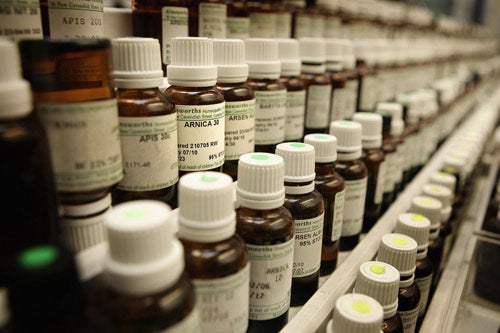Homeopathy 'in crisis' as NHS trusts drop services

NHS trusts are dropping homeopathic treatments following debate over whether they work. A study has found that only 37 per cent of 132 primary care trusts still have contracts for homeopathic services while more than a quarter have stopped or reduced funding in the past two years.
Homeopathy is based on diluting substances – that could otherwise be poisonous – in water or alcohol. Some scientists say homeopathic solutions are diluted so many times they are unlikely to contain any active ingredients at all. There has also been controversy over accreditation.
An investigation by the GPs' newspaper Pulse says homeopathic clinics in the UK "are in crisis". It says the Royal London Homeopathic Hospital is fighting for survival after eight trusts cancelled contracts over the past year and six more reduced referrals.
An investigation by the newspaper found that referrals to the hospital were down 20 per cent in a year.
Dr Tim Robinson, a GP who provides a homeopathic service in Dorset, told Pulse that patients denied the treatments on the NHS may take risks by consulting non-medical homeopathic practitioners.
He said: "They will have to pay someone and go to a non-doctor and there are potential risks with that."
Richard Hoey, deputy editor of Pulse, said: "Homeopathy is a highly controversial treatment with all sorts of doubts over its evidence base, but it is popular with patients and has traditionally always had a place in general practice.
"If the NHS is now going to stop providing homeopathy, that needs to be a decision taken in the full glare of public debate, and not made in the committee rooms of cash-strapped trusts."
A new homeopathy watchdog, the Natural HealthCare Council, is due to begin work in April. Membership of the body will be voluntary but it will have the power to strike organisations off its register.
It has been set up by the Prince of Wales's Foundation for Integrated Health following a request from the Department of Health. The Prince of Wales and the Queen are known to be supporters of homeopathy.
Join our commenting forum
Join thought-provoking conversations, follow other Independent readers and see their replies
Comments
Bookmark popover
Removed from bookmarks